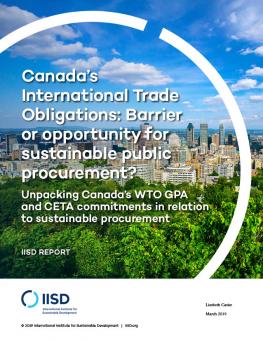
Canada's International Trade Obligations: Barrier or opportunity for sustainable public procurement?
This paper explores the extent to which international trade agreements could pose a barrier to sustainable procurement or, conversely, enable sustainability to take a more prominent role in the procurement process.
Key Messages
- Canada's commitments under the World Trade Organization Agreement on Government Procurement or the Canada–EU Comprehensive Economic and Trade Agreement (CETA) do not impede sustainable public procurement. Where sustainable public procurement is interpreted as favouring certain groups within an economy, such as local suppliers, however, difficulties arise.
- The regulatory framework is often perceived as a barrier to sustainability in the procurement process, but it is not an actual one. Increasingly, regulatory frameworks, in Canada and internationally, make reference to green or sustainable procurement. The actual barriers to sustainable procurement are the capacity of procurement agencies, financial constraints, the absence of political will and recognizing that public procurement is a strategic rather than an administrative function of government.
This paper explores the extent to which Canada's international trade obligations pose a barrier or opportunity for sustainable public procurement. It finds that green procurement is increasingly encouraged in international trade agreements. Social procurement, where attention is paid to worker's conditions across the supply chain, is neither encouraged nor prohibited under the agreements. Favouring selected groups (small and medium-sized enterprises, women-owned or Indigenous-owned enterprises) in society is discouraged and "buying local" is prohibited.
The paper finds also that the number of Canadian entities bound by these international rules has increased with the adoption of the Canada–EU Comprehensive Economic and Trade Agreement (CETA). Nonetheless, many procurement processes do not fall within the realm of the international trade agreements and therefore do not even have to take them into consideration.
Finally, the paper concludes that unpacking the legal framework around public procurement and its relation with sustainability is only one piece of the puzzle. Implementing sustainable procurement also means investing in the skillset of procurers, building in sustainability across the procurement cycle, and working together in a transparent manner with suppliers to ensure that public procurement is used in a strategic way and delivers the best value for money for taxpayers. A set of recommendations at the end of the paper provided input for discussion at a workshop in March 2019.
You might also be interested in
Global Dialogue on Border Carbon Adjustments
This report contributes to the global BCA discussion by summarizing country-level reports reflecting dialogues conducted in Brazil, Canada, Trinidad and Tobago, the United Kingdom, and Vietnam.
Why Liquefied Natural Gas Expansion in Canada Is Not Worth the Risk
An analysis of the economic and environmental risks of liquified natural gas expansion in Canada.
State of the Sector: Critical energy transition minerals for India
This report presents a comprehensive strategy for securing a reliable supply of critical energy transition materials (CETMs) essential to India's clean energy and low-carbon technology initiatives.
Five Key Priorities to End Fossil Fuel Subsidies in Canada
As the G7 president in 2025, Canada has a pivotal opportunity to lead by fully phasing out fossil fuel supports and investing in a cleaner, more equitable future. Here are five recommendations for effective subsidy reform.